The energy and environmental transition, an inexhaustible source of innovation for the university

The Université de Pau et des Pays de l'Adour (UPPA) has been involved in the field of energy and the environment for several years and today stands out for the excellence of its training and research work, both in science and technology and in the social sciences.
The history of our societies is inextricably linked to the mastery of new energy sources. This has led to immense progress, but also to risks arising from the intensive exploitation of our planet. The concept of energy transition refers precisely to all the changes intended today to reduce the environmental impact of energy production, storage, distribution and consumption. This involves the development of renewable energies and new technologies, as well as a reflection on the model of society that we want to build. With one certainty, supported by the University of Pau and the Pays de l'Adour: whatever the discipline, environmental excellence is an inexhaustible source of innovation. And the UPPA has solid skills in this area, which are recognised internationally.
Disruptive technologies
Deputy Director of IPREM (CNRS/UPPA), Laurent Billon develops particularly innovative materials inspired by the animal and plant world. Since 2018, he has been coordinating a European team in charge of developing an artificial leaf device based on the principle of photosynthesis. Just as plants are able to capture solar energy and store it as chemical energy, this project aims to produce hydrogen or raw materials in a stable and storable chemical form. Such a solution would offer an alternative to fossil fuels while limiting greenhouse gas emissions. "We are betting on biomimicry to develop a device capable of transforming the sun into fuel", summarises the researcher from Pau.
The UPPA has also joined forces with two leading industrialists, Saft and Arkema, to develop a revolutionary battery prototype using solid electrolyte technology by 2024. More efficient, less expensive and safer than current Li-ion batteries, these batteries are likely to revolutionise the electric vehicle and renewable energy storage sectors. Led by Professor Hervé Martinez, the project brings together some 50 researchers, engineers and technicians. Sylvain Bourrigaud, head of department at Arkema's Lacq research group, a stakeholder in this technological and industrial challenge, praises the interest of this exceptional partnership: "Arkema, France's leading chemical company, has a vocation to develop new products. We are in the business of 'doing'. The UPPA researchers are developing expertise in materials characterisation. They are in the business of 'understanding' [how a battery works and its performance]. Together with Saft, the European leader in batteries, we are complementary and effective." Sylvain Bourrigaud also cites other joint projects between UPPA and Arkema, such as the work carried out on hydrogen storage in association with the New Aquitaine technology centre for composites and advanced materials (CANOE).
A multidisciplinary approach
However, the energy and environmental transition is not just a question of technology. The issues at stake are societal, economic, legal, etc. A global and multidisciplinary approach is essential to understand, anticipate and support the transformation processes. Law researchers, geographers and economists are working together on societal and legal issues related to energy. Louis de Fontenelle, a lecturer at UPPA and holder of the MOVE partnership chair devoted to the legal issues of sustainable mobility, stresses the importance of bringing together all the sciences: "The energy transition raises complex, highly technical questions at the frontiers of many disciplines. The societal stakes are extremely high and the effort of reflection can only be collective. The lawyer cites, for example, the regulation of the use of electric scooters or the installation of wind turbines. Our work is very much based on foresight," he adds, "we try to anticipate in order to remove the legal obstacles and facilitate the transition".
Sébastien Chailleux, holder of the junior chair "Politisation of the subsoil", works in the same spirit. A specialist in energy and political science, the UPPA teacher-researcher is interested in the issues linked to the use of subsoil: hydrogen storage, shale gas, geothermal energy, etc. "We study the different forms of protest, we analyse the processes implemented by industrialists and we observe the role of political decision-makers," he explains. This is essential work to promote consultation, credibility and legitimacy of projects. In a word, for UPPA, the energy and environmental transition is everyone's business!
